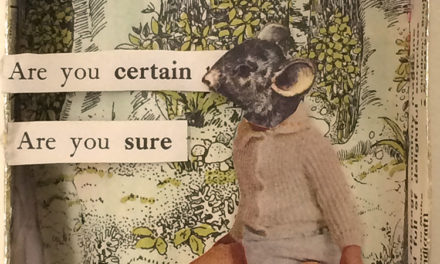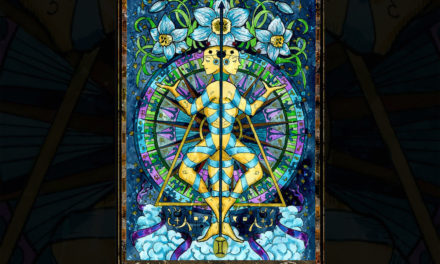Yellow-banded Spider
by Rachel Chimits
Issue 3: Knowledge | 1,432 words

Peng walks slowly back along the alley to his company’s apartment block. Humid summer air hangs thick with the scent of bougainvillea, unseen in the dark. The skitter of rats precedes him; in the sparse streetlights, he sees their scurrying gray forms, as large as his foot.
He’ll have to take his suit to a back-alley cleaner tomorrow during lunch break. And pray that his boss won’t come to his cubical early and smell Harbin beer and the cigarettes that he keeps in a shiny Chengshi box. Not that he could ever afford to smoke such an expensive brand of cigarettes, but he found the empty box in a trash heap near the Bank of China and picked it up. Now he packs it with far cheaper cigarettes and smiles vaguely when coworkers comment on loyalty to his chilly Shaanxi region.
His apartment complex, a concrete block with battered steel doors, is from the old regime. Inside his unit is a two-meter-long kitchen with space for a stove, a narrow table, and two stools. A curtain cordons off his bedroom; he has enough room to walk around his single person cot. The box closet holds an extra pair of slacks, two dress shirts, a t-shirt, one pair of jeans, and his only suit.
By the apartment’s lone light, a bare bulb hanging strategically halfway between bedroom and kitchen, he undresses and decides to let the suit air out. Then he sits, bone-weary, on the edge of the cot, knees poking into the kitchen. A bundle of greens and thin slice of tofu wait to be cooked, but he doesn’t move.
A spindle-thin movement from the table catches his eye.
Thin silk thread hangs from the stool. A yellow-legged spider as big as his palm pauses in the midst of its industry. Its body is petite, the size of a black pearl button, like those the Sons of Heaven once wore.
Really, he ought to kill it.
His năinai told him that the zhīzhū catches good fortune in its web.
He listlessly watches the yellow-legged spider resume its work, then flicks out the light and rolls back into the cot’s ribbed embrace. Between the foreigners’ French Quarter and the towering Pudong Lujiazui financial districts, Shanghai has no space for backwater legends.
The next morning, he waits to put on his suit jacket until he is inside. He smiles at coworkers already behind their desks and carefully pronounces, “Ni hao. Hen hao ma?”
While it is painfully apparent that he is provincial, no one has yet guessed that he is Hui, not proper Han Chinese. At least not yet. He tries to avoid pork, but surely Allah understands that he must keep this job, that some things must be eaten to avoid disgracing seniors in the company. Still, he always chews slowly and feels ill.
All of his coworkers are nominally Buddhist or Taoist, even if they shrug at dinners, expensive Hongta Shan smoldering between their fingertips. “You know how it is with family.” Or, “My grandfather was a monk. What can I do?”
A rap on his cubical wall makes him jump. His supervisor leans around the corner, “Do you have my folder on loan requisitions ready?”
“I just need to type up one more thing, and then…” He notices the man staring and swallows, a slow burn works up the back of his neck. “Shì de. The file is nearly complete. I will have it to you very soon.”
“Cènà nóng,” his supervisor sighs. “Just don’t talk to my clients when you come in.”
Peng nods, the heat crawling up the backs of his ears like a red centipede. He’s not a peasant. Not really. In Yan’an his family has done well. His father has a government position in the Baota District.
No one in Shanghai has heard of these names, or cares.
That evening on the bus, he holds his suit jacket over one arm. He spots a pair of yellow heels in the crowd of damp shoes. Slim ankles draw up from the bright heels. The bone beneath pale skin is an ivory bell inverted.
A light tug at his elbow makes him jump. In the crowd’s crush, he can’t see who it belongs to until she speaks.
“Qîng wèn. Do you have an umbrella?” The yellow shoes’ owner stares up at him with almond eyes. Pale throat leading like the Silk Road down into the black V of her collar. “I’m sorry to bother you.”
He reanimates. “No, no. Of course, you may have this one.” He offers his black umbrella to her. “Are you from Shaanxi?”
Her smile is slight but true. “Yes. I thought you sounded like home. Are you from Xi’an?”
He shakes his head. “Yan’an, in Baota.”
“It’s a long way from here.” Her wistful tone is sweet as a pipa’s song. “It’s nearly National Day. Will you be going home?”
He shakes his head. “I’m too busy.”
“Your family will miss you.”
“I know, but there’s still Spring Festival.”
The driver calls out his stop, and the doors open to reveal a heavy downpour. His suit will be ruined.
She stands. “Is this also where you get off?”
“Yes.” He’s briefly, absurdly grateful.
She opens the umbrella out the door, and they both step down into the wet streets. She puts her arm through his so they can both huddle under the umbrella.
“Do you often come this way from work?”
“Yes.” His mouth nearly touches the pale shell of her ear. “Do you?”
She nods. “I hope I will see you tomorrow. Your voice makes me feel at home again.”
“Do you want to go to dinner?” The question slips out before he can think.
Her face turns toward him like the moon. “I will consider it.” She cocks her head. “My name’s Hēi Zhēnzhū.” At the alley, she pauses. “My home is that way.” Her finger points off into the dark and she presses the umbrella back into his hand.
“No, take it.”
She shakes her head. “Thank you. You’ve been kind. I’ll look forward to tomorrow now.” Then she is gone, her yellow heels left flashing against the uneven pavement—the rest of her slim form eaten up by the dark.
He nearly runs after her to insist she take the umbrella, then he realizes that his slacks are soaked from the ankles down and runs home. In the doorway, he shakes off his umbrella then stops. The narrow kitchen assaults him. He can barely afford twenty yuan for vegetables to cook the next two days’ meals. How will he buy dinner for two? And where will he take her? A karaoke bar that easily costs three hundred yuan? For drinks that cost fifty yuan each?
No. Think.
If he sells his extra slacks, he can cook a meal for them both. Maybe even buy a little chicken for a dish. Then… then…
Bring her to sit on these faded green plastic stools? To trade chopsticks while they eat because he only has one pair? After this charming fare, back to his cot?
“Fage.” The hard word reminds him of the foreigners who so often patron the bank and their harsh faces, noses so sharp they could cut paper, and uneven speech. “Fuck.”
Like a paper-thin twig, the spider’s leg delicately extends from beneath one stool. It picks its way toward a fly.
Grimacing, Peng flips the stool and whips his umbrella through the web. The spider bounces across the kitchen floor, its legs spasming. He lunges, bringing the umbrella down hard on it. A crunch like a crushed almond—one leg spins across the concrete, twitching.
He sweeps it into the trash, sets the stool down, then goes back to his room to hang his jacket and pants to dry. The extra pair of work slacks he carefully folds and places in paper.
The woman below him is happy to buy them for her husband. He has thirty extra yuan now. Enough for a chicken breast. Three or four brown mushrooms. Maybe he can make hot pot. Peasant food, but perhaps she won’t mind.
A girl as pretty as her, though?
The next day, his supervisor yells at him. He bows, apologizes, then secretly writes a shopping list on his memo paper. They could sit beneath the mango trees in the nearby park. They could eat there and watch for bats in the twilight.
But she isn’t on the bus that evening.
Nor the next.
Or any of the days after.

Rachel Chimits
Rachel Chimits has an MFA in creative fiction from the University of Nevada, Reno and works as a content writer and editor for World Challenge Inc. Her short story “At the End” has appeared in the Dark Company II anthology, and “Dead Wings” is forthcoming in Parvus Press’s anthology If This Goes On. She grew up on a ranch and was occasionally chased by llamas.




